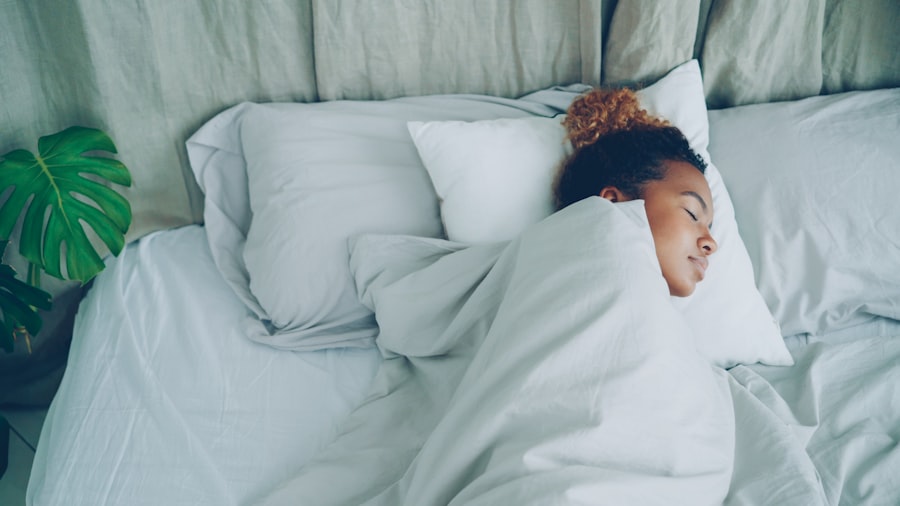The sleep-wake cycle is a fundamental aspect of human life, influencing not only your physical health but also your mental well-being. This cycle is governed by a complex interplay of biological processes that dictate when you feel alert and when you feel the need to rest. Understanding this cycle is crucial for optimizing your daily routines and enhancing your overall quality of life.
As you navigate through your day, your body naturally transitions between states of wakefulness and sleep, responding to various internal and external cues. At its core, the sleep-wake cycle is regulated by your body’s internal clock, known as the circadian rhythm. This rhythm operates on a roughly 24-hour cycle, responding to environmental factors such as light and temperature.
When you grasp the intricacies of this cycle, you can make informed choices that promote better sleep hygiene and overall health. By recognizing the importance of sleep and its impact on your daily functioning, you can take proactive steps to ensure that you are getting the restorative rest you need.
Key Takeaways
- The sleep-wake cycle is a natural, internal process that regulates the sleep and wake states over a 24-hour period.
- Circadian rhythms play a crucial role in regulating the sleep-wake cycle and are influenced by external factors such as light and temperature.
- Sleep consists of four stages, including REM and non-REM sleep, each with distinct characteristics and functions.
- Factors such as stress, caffeine, and irregular sleep patterns can disrupt the sleep-wake cycle and lead to sleep disturbances.
- Technology, particularly screens emitting blue light, can negatively impact the sleep-wake cycle by disrupting circadian rhythms and delaying the onset of sleep.
The Role of Circadian Rhythms in Sleep
Circadian rhythms play a pivotal role in regulating your sleep-wake cycle. These natural processes are influenced by external cues, primarily light, which helps signal to your body when it is time to be awake and when it is time to sleep. As daylight fades, your body begins to produce melatonin, a hormone that promotes sleepiness.
Conversely, exposure to natural light in the morning helps suppress melatonin production, signaling that it’s time to rise and shine. This delicate balance is essential for maintaining a healthy sleep pattern. Your circadian rhythm is not just a simple timer; it is a sophisticated system that affects various bodily functions beyond sleep.
It influences hormone release, eating habits, and even body temperature. When your circadian rhythm is aligned with your lifestyle, you are likely to experience better sleep quality and improved mood. However, disruptions to this rhythm—such as shift work or irregular sleep patterns—can lead to a host of issues, including insomnia and daytime fatigue.
Understanding how circadian rhythms work can empower you to make lifestyle adjustments that support a more natural sleep-wake cycle.
The Stages of Sleep

Sleep is not a uniform state; rather, it consists of several distinct stages that play unique roles in your overall restfulness. These stages are broadly categorized into two types: non-REM (Rapid Eye Movement) sleep and REM sleep. Non-REM sleep is further divided into three stages, each characterized by different brain wave patterns and physiological changes.
During the first stage, you transition from wakefulness to light sleep, where you may experience drifting thoughts and sensations. The second stage marks a deeper level of sleep, where your heart rate slows and body temperature drops. Finally, the third stage is known as deep sleep or slow-wave sleep, which is crucial for physical restoration and recovery.
REM sleep, on the other hand, is where most dreaming occurs. This stage typically follows the non-REM stages and is characterized by increased brain activity and rapid eye movements. REM sleep plays a vital role in cognitive functions such as memory consolidation and emotional regulation.
As you cycle through these stages multiple times throughout the night, each phase contributes to your overall health and well-being. Understanding these stages can help you appreciate the complexity of sleep and its importance in rejuvenating both your body and mind.
Factors Affecting the Sleep-Wake Cycle
| Factor | Description |
|---|---|
| Light | Exposure to light affects the production of melatonin, a hormone that regulates sleep-wake cycles. |
| Stress | High levels of stress can disrupt the sleep-wake cycle and lead to insomnia. |
| Diet | Consuming caffeine, heavy meals, or alcohol close to bedtime can interfere with sleep. |
| Exercise | Regular physical activity can improve sleep quality, while intense exercise close to bedtime may have the opposite effect. |
| Technology | Exposure to screens emitting blue light, such as smartphones and computers, can disrupt the sleep-wake cycle. |
Numerous factors can influence your sleep-wake cycle, ranging from lifestyle choices to environmental conditions. One significant factor is stress; when you are under pressure or experiencing anxiety, it can be challenging to relax and fall asleep. Your mind may race with thoughts or worries, making it difficult to transition into a restful state.
Additionally, dietary choices can also play a role; consuming caffeine or heavy meals close to bedtime can disrupt your ability to fall asleep or stay asleep throughout the night. Environmental factors such as noise, light exposure, and temperature can also significantly impact your sleep quality. A noisy environment may prevent you from falling into deep sleep, while excessive light can interfere with melatonin production.
Furthermore, irregular sleep schedules—such as those caused by shift work or frequent travel—can throw off your circadian rhythm, leading to difficulties in maintaining a consistent sleep pattern. By identifying these factors in your life, you can take steps to mitigate their effects and create an environment conducive to restful sleep.
The Impact of Technology on the Sleep-Wake Cycle
In today’s digital age, technology has become an integral part of our lives, but it also poses challenges for maintaining a healthy sleep-wake cycle. The blue light emitted by screens—whether from smartphones, tablets, or computers—can interfere with melatonin production, making it harder for you to fall asleep at night. Many people find themselves scrolling through social media or watching videos late into the evening, inadvertently delaying their bedtime and disrupting their natural rhythms.
Moreover, the constant connectivity provided by technology can lead to increased stress and anxiety levels. Notifications from emails or social media can create a sense of urgency that keeps your mind active even when it should be winding down for the night. To combat these effects, consider implementing a digital curfew by setting aside screens at least an hour before bedtime.
This simple change can help signal to your body that it’s time to relax and prepare for restful sleep.
Tips for Improving the Sleep-Wake Cycle

Improving your sleep-wake cycle requires intentional effort and lifestyle adjustments. One effective strategy is establishing a consistent bedtime routine that signals to your body that it’s time to wind down. This could include activities such as reading a book, practicing relaxation techniques like deep breathing or meditation, or taking a warm bath.
By creating a calming pre-sleep ritual, you can help ease the transition from wakefulness to restfulness. Another important tip is to optimize your sleeping environment. Ensure that your bedroom is dark, quiet, and cool—conditions that are conducive to quality sleep.
Consider using blackout curtains or an eye mask to block out light and earplugs or white noise machines to minimize disruptive sounds. Additionally, try to limit exposure to screens before bed; instead of scrolling through social media or watching TV, engage in activities that promote relaxation and prepare your mind for rest.
Sleep Disorders and the Sleep-Wake Cycle
Sleep disorders can significantly disrupt your sleep-wake cycle and overall health. Conditions such as insomnia, sleep apnea, and restless leg syndrome can lead to difficulties in falling asleep or staying asleep throughout the night. Insomnia is characterized by persistent trouble falling asleep or waking up too early, often resulting in daytime fatigue and irritability.
If you suspect that you may have a sleep disorder affecting your sleep-wake cycle, it’s essential to seek professional help. A healthcare provider can conduct assessments and recommend appropriate treatments tailored to your specific needs.
Addressing these disorders not only improves your quality of sleep but also enhances your overall well-being by reducing daytime drowsiness and improving cognitive function.
The Relationship Between Nutrition and the Sleep-Wake Cycle
What you eat can have a profound impact on your sleep-wake cycle. Certain foods contain compounds that promote relaxation and support better sleep quality. For instance, foods rich in magnesium—such as leafy greens, nuts, and seeds—can help calm the nervous system and promote restful sleep.
Similarly, complex carbohydrates found in whole grains can increase serotonin levels in the brain, contributing to feelings of well-being and relaxation. On the flip side, consuming heavy meals or stimulants like caffeine close to bedtime can disrupt your ability to fall asleep. Caffeine can remain in your system for several hours, making it difficult for you to wind down at night.
Additionally, alcohol may initially make you feel drowsy but can lead to fragmented sleep later in the night. By being mindful of your dietary choices throughout the day and especially before bedtime, you can support a healthier sleep-wake cycle.
The Effects of Exercise on the Sleep-Wake Cycle
Regular physical activity has been shown to have numerous benefits for your overall health—and one of those benefits includes improved sleep quality. Engaging in exercise helps regulate hormones associated with stress and anxiety while promoting relaxation through the release of endorphins. Whether it’s a brisk walk during lunch or an evening yoga session at home, incorporating movement into your daily routine can help enhance your ability to fall asleep more easily at night.
However, timing matters when it comes to exercise and its effects on sleep. While morning or early afternoon workouts can boost energy levels throughout the day without interfering with nighttime restfulness, exercising too close to bedtime may have the opposite effect for some individuals. It’s essential to listen to your body and find a routine that works best for you—one that allows you to reap the benefits of exercise while still promoting a healthy sleep-wake cycle.
Understanding the Importance of a Consistent Sleep Schedule
Establishing a consistent sleep schedule is one of the most effective ways to support a healthy sleep-wake cycle. Going to bed and waking up at the same time every day helps regulate your body’s internal clock, making it easier for you to fall asleep at night and wake up feeling refreshed in the morning. This consistency reinforces your circadian rhythm and promotes better overall sleep quality.
In addition to regularity in timing, it’s also important to consider how long you are sleeping each night. Most adults require between seven to nine hours of quality sleep for optimal functioning during the day. By prioritizing both consistency in timing and adequate duration of rest, you set yourself up for success in maintaining a balanced sleep-wake cycle that supports both physical health and mental clarity.
Maintaining a Healthy Sleep-Wake Cycle
In conclusion, understanding the intricacies of the sleep-wake cycle empowers you to make informed choices that enhance your overall well-being. By recognizing the role of circadian rhythms, stages of sleep, and various factors affecting this cycle—including technology use, nutrition, exercise habits, and consistency—you can take proactive steps toward achieving better restfulness each night. Prioritizing quality sleep is not merely about avoiding fatigue; it’s about fostering a lifestyle that supports both physical health and mental clarity.
By implementing practical strategies such as establishing bedtime routines, optimizing your sleeping environment, being mindful of dietary choices, engaging in regular exercise, and maintaining consistency in your schedule, you pave the way for improved health outcomes and enhanced quality of life. Ultimately, nurturing a healthy sleep-wake cycle is an investment in yourself—a commitment that pays dividends in energy levels, mood stability, cognitive function, and overall happiness. Embrace this journey toward better restfulness; after all, every good day begins with a good night’s sleep.
The sleep-wake cycle is a fundamental aspect of human biology, influencing various physiological and psychological processes. Understanding this cycle can significantly impact mental health and overall well-being. For those interested in exploring more about the intricacies of sleep and its effects on mental health, a related article can be found on Unplugged Psych. This resource delves into the psychological aspects of sleep and offers insights into how sleep patterns can affect mental health. To read more, visit the article on Unplugged Psych.
WATCH THIS! Is This Hidden ADHD Sign Quietly Wrecking Your Sleep and Draining Your Energy?
FAQs
What is the sleep-wake cycle?
The sleep-wake cycle, also known as the circadian rhythm, is a natural, internal process that regulates the sleep-wake cycle and repeats roughly every 24 hours.
What controls the sleep-wake cycle?
The sleep-wake cycle is controlled by the body’s internal clock, which is located in the brain and is influenced by external factors such as light and temperature.
Why is the sleep-wake cycle important?
Maintaining a regular sleep-wake cycle is important for overall health and well-being. Disruptions to the sleep-wake cycle can lead to sleep disorders, fatigue, and other health issues.
How does the sleep-wake cycle affect sleep patterns?
The sleep-wake cycle helps regulate the timing of when we feel sleepy and when we feel awake, and influences the quality and duration of our sleep.
What are some factors that can disrupt the sleep-wake cycle?
Factors such as shift work, jet lag, irregular sleep schedules, and exposure to artificial light at night can disrupt the sleep-wake cycle.
How can I regulate my sleep-wake cycle?
Regulating the sleep-wake cycle can be achieved by maintaining a consistent sleep schedule, getting exposure to natural light during the day, and avoiding bright lights and screens before bedtime.




